|
This is my dynamic, frequently updated homepage. This is a NewsLog, also known as a WebLog or Blog.
Everything is evolving, so don't assume too much.
People to watch:
Adina Levin
Andrius Kulikauskas
Britt Blaser
Catherine Austin Fitts
Chris Corrigan
Clay Shirky
Dan Gillmor
Dave Pollard
David Allen
David Weinberger
Dewayne Mikkelson
Dina Mehta
Doc Searls
Elisabet Sahtouris
Elizabeth Lawley
Euan Semple
Florian Brody
Frank Patrick
Gen Kenai
George Dafermos
George Por
Graham Hancock
Greg Elin
Hazel Henderson
Heiner Benking
Inspector Lohman
Jean Houston
Jerry Michalski
Jim McGee
Jim Moore
John Abbe
John Perry Barlow
John Robb
Joi Ito
Jon Husband
Jon Lebkowsky
Jon Udell
Jonathan Peterson
Judith Meskill
Julian Elvé
Julie Solheim
Kevin Marks
Lawrence Lessig
Leif Smith
Letecia Layson
Lilia Efimova
Lisa Rein
Marc Canter
Mark Oeltjenbruns
Mark Pilgrim
Mark Woods
Martin Dugage
Martin Roell
Mary Forest
Matt Mower
Max Sandor
Michael Fagan
Mike Owens
Mikel Maron
Mitch Kapor
Mitch Ratcliffe
Nathalie dArbeloff
Netron
Noam Chomsky
Paul Hughes
Peter Kaminski
Phil Wolff
Philippe Beaudoin
Ray Ozzie
Raymond Powers
Rebecca Blood
Roger Eaton
Roland Tanglao
Ross Mayfield
Scott Lemon
Sebastian Fiedler
Sebastien Paquet
Skip Lancaster
Spike Hall
Steven Johnson
Stuart Henshall
Thomas Burg
Thomas Madsen-Mygdal
Thomas Nicholls
Timothy Wilken
Todd Suomela
Tom Atlee
Tom Munnecke
Tom Tomorrow
Ton Zijlstra
Lionel Bruel
Loic Le Meur
Nancy White
Mark Frazier
Merlin Silk
Robert Paterson
Colby Stuart
Nova Spivack
Dan Brickley
Ariane Kiss
Vanessa Miemis
Bernd Nurnberger
Sites to watch:
Electronic Frontier Foundation
Co-intelligence Institute
Free Expression Network
Collective Intelligence
Action without borders
Manufacturing Dissent
Explorers Foundation
Disclosure Project
ThoughtsOnThinking
Forbidden Science
Emergent by Design
Greater Democracy
Global Ideas Bank
Independent Media
Space Collective
Friendly Favors
Escape Velocity
Disinformation
Collective Web
WorldChanging
YES Magazine
Disinfopedia
NotThisBody
MetaFilter
Webcamorama
BoingBoing
Smart Mobs
Do No Harm
Imaginify
FutureHi
Openworld
Nanodot
HeadMap
Rhizome
Absara
Edge
Junto
French:
Emmanuelle
Manur
Elanceur
Loeil de Mouche
IokanaaN
Blog d'Or
Le Petit Calepin
GeeBlog
Absara
Guillaume Beuvelot
Ming Chau
Serge Levan
Jean Michel Billaut
C'est pas Mécanique

I live in Toulouse, France where the time now is:
01:08
Unique Readers:

Primarily
Public Domain
Everything I've written here is dedicated to the
Public Domain.

The quotes from other people's writings, and the pictures used might or might not be copyrighted, but are considered fair use. Thus, overall, this weblog could best be described as being:
Primarily Public Domain. |
Syndication:
 ![Validate my RSS feed [Valid RSS]](http://www.newciv.org/pic/valid-rss.png)
|
| Thursday, December 5, 2002 |  |
|
|
|
 I'm at the Prophet's Conference in Palm Springs for a couple of days. A great group of speakers, and old friends to meet. Sofar, a great talk by John Perry Barlow on "Tending the Garden of Mind". He is just fabulous at weaving things together. This is not really his typical crowd, so it also became a bit of an education for the audience. In short, there are strong forces out there who would like to own the content of your mind, so get educated enough to do something about it. Nobody can own ideas, and it is all the same mind stuff that flows through all of us anyway. I'm at the Prophet's Conference in Palm Springs for a couple of days. A great group of speakers, and old friends to meet. Sofar, a great talk by John Perry Barlow on "Tending the Garden of Mind". He is just fabulous at weaving things together. This is not really his typical crowd, so it also became a bit of an education for the audience. In short, there are strong forces out there who would like to own the content of your mind, so get educated enough to do something about it. Nobody can own ideas, and it is all the same mind stuff that flows through all of us anyway.
After that there was a panel, with John, and Barbara Marx Hubbard, Gregg Braden, Nicky Scully, and some young people representing the conscious dance culture. Very stimulating fusion of energy there. Talk of more merging of rhythm and art into these more cerebral ideas. Talk of how we're all Natives of the Now, the new indiginous people.
[ Diary | 2002-12-05 19:55 | | PermaLink ] More >
|
|
|
|
 Paul Ray and Sherry Anderson were also giving separate speeches here at the Prophet's Conference. They're the authors of Cultural Creatives, and Paul invented the term based on his marketing research. Lately Paul has been talking and writing about a "new political compass", which comes out of a lot more surveys of many Americans. When I first read about it, I thought it was sort of boring, as it mainly is a conclusion that the left/right political spectrum doesn't cut it. But now I got the point much better. Most importantly, the study pinpoints specific characteristics of a group of people, which Paul puts as North on his political compass. He calls them New Progressives, says they're neither left nor right, but they're against big business and globalization, they're for the environment, for personal development. More willing to volunteer and take action than any other group, but nobody is noticing the group or speaking to them. In terms of politics and big media, that is. And the point is that if this group would recognize itself, it could be the most powerful force in U.S. politics. Or, rather, the breakthrough is not just that it might be a good thing, but Paul Ray shows that it IS the biggest force in U.S. politics, and it just doesn't know it yet. 45% of the people who vote. Paul Ray and Sherry Anderson were also giving separate speeches here at the Prophet's Conference. They're the authors of Cultural Creatives, and Paul invented the term based on his marketing research. Lately Paul has been talking and writing about a "new political compass", which comes out of a lot more surveys of many Americans. When I first read about it, I thought it was sort of boring, as it mainly is a conclusion that the left/right political spectrum doesn't cut it. But now I got the point much better. Most importantly, the study pinpoints specific characteristics of a group of people, which Paul puts as North on his political compass. He calls them New Progressives, says they're neither left nor right, but they're against big business and globalization, they're for the environment, for personal development. More willing to volunteer and take action than any other group, but nobody is noticing the group or speaking to them. In terms of politics and big media, that is. And the point is that if this group would recognize itself, it could be the most powerful force in U.S. politics. Or, rather, the breakthrough is not just that it might be a good thing, but Paul Ray shows that it IS the biggest force in U.S. politics, and it just doesn't know it yet. 45% of the people who vote.
[ Politics | 2002-12-05 23:59 | | PermaLink ] More >
|
|
| Wednesday, December 4, 2002 |  |
|
|
|
Several of my good friends are trying to get around to starting their weblog, but have a hard time finding the time and courage to get going. Here is some good advice from Ross Mayfield from the Ryze Blog & Bloggers tribe:"They say you play soccer the way you are. I think blogging is similar to this self-organizing sport. You blog the way you are.
When confronted with the chronological format of a blog, the pressure to post is at first extreme. How do I start? What if I don't keep it up? Does this go on my permanent record? But the reality is there is no shame in an empty calendar. Post daily, weekly, monthly or occassionally. You blog when you can.
The question that is most personal is what to blog. As one blogger said, "Find a topic and own it." Finding focus is a sure time saver, but it also contributes to the medium, as its one of specialized voices. The more you post on your domain the better. You blog what you are.
The other part, indeed what this tribe is about, is community. When you have others reading, others you know, their feedback and their own posts spark your own. You don't blog alone.
Make a little plan on how you will start, just begin and you will find your rhythm." I guess what mostly can be intimidating is if one feels the pressure to produce posts very regularly, like every day, or one feels a pressure to share parts of oneself that one maybe isn't ready for. And, as he says, you can really post whenever it fits your rhythm. And you can post whatever makes sense for you. It doesn't have to be super-smart or super-personal or anything. And in the NewsLogs in NCN it should be even more gentle for you than in most other places, as you don't have to reveal it for the whole world right away, and you have a supportive community around you.
[ Information | 2002-12-04 16:38 | | PermaLink ] More >
|
|
|
|
 From Eclectricity: "The town of Bowie Maryland on the outskirts of Washington has built a fountain based on the mathematical ideas of the great mathematician Fibonacci. From Eclectricity: "The town of Bowie Maryland on the outskirts of Washington has built a fountain based on the mathematical ideas of the great mathematician Fibonacci.The fountain's design embodies an intimate link between Fibonacci numbers and an irrational number known as the golden ratio, (1 + sqrt[5])/2, or 1.6180339887. . . . Ratios of successive terms of the Fibonacci sequence get closer and closer to the golden ratio. For example, the ratio 55/34 is 1.617647. . ., and the next ratio, 89/55, is 1.6181818. . ., and so on. Successive ratios alternate in overshooting and undershooting the golden ratio by decreasing amounts."
[ Patterns | 2002-12-04 20:10 | | PermaLink ] More >
|
|
|
|
 John Poindexter is the U.S. Federal Information Czar. Not too long ago he was in prison for being an Iran-Contra conspirator. But now he's in charge of gathering information on all Americans. John Gilmore has an excellent demonstration for him of what it means to have your information pried into, as does the SF Weekly. John Poindexter is the U.S. Federal Information Czar. Not too long ago he was in prison for being an Iran-Contra conspirator. But now he's in charge of gathering information on all Americans. John Gilmore has an excellent demonstration for him of what it means to have your information pried into, as does the SF Weekly."The SF Weekly's column by Matt Smith in the Dec 3 issue points out that there may be some information that John M. and Linda Poindexter of 10 Barrington Fare, Rockville, MD, 20850, may be missing in their pursuit of total information awareness. He suggests that people with information to offer should phone +1 301 424 6613 to speak with that corrupt official and his wife. Neighbors Thomas E. Maxwell, 67, at 8 Barringon Fare (+1 301 251 1326), James F. Galvin, 56, at 12 (+1 301 424 0089), and Sherrill V. Stant (nee Knight) at 6, may also lack some information that would be valuable to them in making decisions -- decisions that could affect the basic civil rights of every American."
[ Politics | 2002-12-04 20:47 | | PermaLink ] More >
|
|
|
|
Tom Atlee: Dynamic Facilitation/Choice-creating: "'Dynamic facilitation', created by consultant Jim Rough, is a facilitation style that follows the energy of a group without constraining that energy to agendas or exercises. Using this style, someone can facilitate a highly co-creative process Jim calls 'choice-creating'." Lots of good stuff referenced from Tom's presentation. And see Jim Rough's site and book. The site has this chart on a page about self-organizing change: | Two Models of Change | | Manageable (Type 1) | Self-Organizing (Type 2) | | | e.g. a machine, monarchy, traditional meeting | e.g. a living organism, democracy, dialogue | | How order is determined | It is organized by someone
(extrinsic forces) - Build it / Do it... with no mistakes
- Closed boundaries
- Mostly stable with periodic disorder
| Order comes from within
(intrinsic energy) - Explore / trial and error
- Open boundaries
- Dynamic... between chaos and order
| | Thinking | Stay rational
....avoid the unconscious mind
- Decide on goals ... avoid feelings
- Discern and analyze
- Stop things from going wrong
| Be creative
....work with the unconscious mind - Energy driven... include feelings
- Generate and synthesize
- Seek what's right ... i.e. quality
| | Leadership | Manage to get results
- Can measure progress
- Emphasize extrinsic motivation
....(rewards) - Static process... step by step
| Facilitate the process - Use milestones to reflect on progress
- Emphasize intrinsic motivation
....(mission, vision) - Dynamic process... the flow
| | Orientation | Stop things from going wrong
- There are objective constraints
- All is measurable
- Eliminate chaos
| Help things go right - Expect breakthroughs
- Measuring can affect the process
- Some chaos is essential
|
[ Organization | 2002-12-04 22:54 | | PermaLink ] More >
|
|
| Tuesday, December 3, 2002 |  |
|
|
|
 Patterns interest me greatly. No, not on wallpaper or embroidery. The patterns that people or ideas or things might be arranged in, and what those different patterns mean, or what they allow to happen. That is essential to fields spanning from architecture to organization to language to magic. Patterns interest me greatly. No, not on wallpaper or embroidery. The patterns that people or ideas or things might be arranged in, and what those different patterns mean, or what they allow to happen. That is essential to fields spanning from architecture to organization to language to magic.
It is probably Chris Alexander who most brought forward that way of looking at patterns. He is an architect who wrote "A Pattern Language". It is at first glance a book about architecture, about building buildings. But really it is about the patterns of arranging things so that good things happen with and for people. It contains a 'vocabulary' of hundreds of detailed patterns and describes in detail why they are arranged that way, and what they accomplish. And what I find most interesting is the possibilities in taking a similar philosophy much further, and finding it in other places. The following is from a review of the book by audrey_the_librarian: "While others have noted that Alexander's ideas inspired changes in software engineering, I would also like to note that the author's ideas were, in turn, most likely informed by others, such as neuroscientist Karl Lashley and, in particular, linguist Noam Chomsky. Chomsky developed the idea of a generative grammar, composed of constituent symbols, a set of rules and a set of terminal elements, which together describe all possible sentences in a language. This was considered revolutionary at the time and is quite similar to Alexander's characterization of his patterns, described as a context combined with a system of forces or rules generating an infinite number of solutions in the form of sets of specific design elements. That configuration, in turn, becomes the context for another pattern. The theory's dynamism and scalability render it very powerful indeed.
I think another interesting approach to this philosophy would be to reverse engineer our own environment. To say, Obviously there is a Pattern Language at work in the larger world in which we live, and it is decidedly in opposition to what Mr. Alexander and others, including myself, believe is preferred. What are the rules of that language? What is the context within which those elements operate? The author codifies a desirable Pattern Language. I'd like to see his principles used to turn an eye toward decodifying our own milieu. This is the kind of book that leads one to think and imagine, and isn't that a wonderful thing?" Yes, indeed, reverse engineering and decodifying the world we live in, to be able to talk about its patterns - that would be a very good thing.
[ Patterns | 2002-12-03 15:39 | | PermaLink ] More >
|
|
|
|
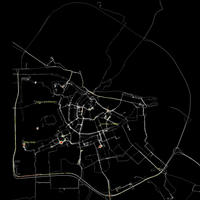 In an experiment in Amsterdam lots of the city's inhabitants were equipped with GPS (Global Positioning System) devices for two months, in order to make a realtime map of the city. The map is created exclusively from the accummulated movements of individuals. And, of course, people who ride bicycles create different maps from people in cars or subways. In an experiment in Amsterdam lots of the city's inhabitants were equipped with GPS (Global Positioning System) devices for two months, in order to make a realtime map of the city. The map is created exclusively from the accummulated movements of individuals. And, of course, people who ride bicycles create different maps from people in cars or subways.
[ Patterns | 2002-12-03 19:57 | | PermaLink ] More >
|
|
|
|
Lawrence Lessig talks about the 1976 Copyright Act which, amongst other things, greatly extended the previous length of copyrights. A 1998 U.S. law extended them further. See timeline. Big publishers and media companies are perfectly happy with that, wanting to keep their own copyrights for as long as possible, claiming exclusive rights would be the only way of assuring that the content would get distributed. Nowadays, with the Internet, that would in many areas be a blatant lie. For example, the U.S. Copyright Office and IMBD say there are close to 37,000 movies released in the period 1927-46. Of those only 2,480 are available in any format, which is 6.8%. In other words 93.2% is not available, because it is owned exclusively be somebody who doesn't see any commercial interest in distributing it. As Lessig asks: "Does anyone really doubt the public domain wouldn't do better?"
[ Knowledge | 2002-12-03 23:59 | 0 comments | PermaLink ]
|
|
| Monday, December 2, 2002 |  |
|
|
|
CNET reports on a software license created by Hacktivismo, which includes clauses to "promote fundamental human rights of end-users". It forbids that the software is used for anything that violates the United Nations' Universal Declaration of Human Rights, and additionally, the monitoring of individuals, filtering of free expression, and more. If we do need restrictive licenses all, this would certainly be a fruitful approach. Way to go!
[ Politics | 2002-12-02 02:42 | 0 comments | PermaLink ]
|
|
|
|
 Slashdot reports: "VW/Audi has a history of being a leader in creating super fuel efficient vehicles. They currently sell the most fuel efficient car in the world, 3L Lupo and the Audi A2, and the most fuel efficient station wagon (Jetta TDI Wagon). Now VW is experimenting with something along the lines of the Honda Insight ( a 2 person vehicle ). The 1L VW concept car can achieve .89L/100kms or 239MPG. With Biodiesel and Ultra low sulfur diesel becoming available, hopefully more of these vehicles will come to North America. These fuels are already available in Europe and combined with the new catalyst technology they use, these new engines produce very low emissions." Slashdot reports: "VW/Audi has a history of being a leader in creating super fuel efficient vehicles. They currently sell the most fuel efficient car in the world, 3L Lupo and the Audi A2, and the most fuel efficient station wagon (Jetta TDI Wagon). Now VW is experimenting with something along the lines of the Honda Insight ( a 2 person vehicle ). The 1L VW concept car can achieve .89L/100kms or 239MPG. With Biodiesel and Ultra low sulfur diesel becoming available, hopefully more of these vehicles will come to North America. These fuels are already available in Europe and combined with the new catalyst technology they use, these new engines produce very low emissions."
[ Technology | 2002-12-02 02:56 | | PermaLink ] More >
|
|
|
|
Doc Searls quotes Britt Blaser, who in Is our Sense Becoming More Common? says good stuff like:"It's not Republicans vs. Democrats or conservatives vs. liberals, it's us vs. THEM. People vs. big organizations using people's money against people's interests. If you're against big government - as you should be - then also oppose companies big enough to influence governments.
The current administration is oppressing all citizens with its own version of big government - in the most virulent form we've ever seen - bureaucracies that Republicans won't try to dismantle. Without the Republicans' traditionally trustworthy counterbalance against big gummint, we may be facing the darkest time in our history.
As Charley Reese pointed out, FDR, the legendary big-government guy, had about 15 people on staff while fighting his world war. George W's got 3,000 bureaucrats directing the biggest military of all time and he still can't find a 6' 4" Arab on dialysis. Isn't this a good time for less government, fewer intrusions and more candor?" It certainly is. And I'd also like to add that it is very peculiar that the U.S. political parties usually end up doing the exact opposite of what they supposedly stand for. The Republicans supposedly stand for less government and taxes. Ronald Reagan skyrocketed the U.S. national debt and the tax burden more than any U.S. president before him. And George W. here has created more debt and bureacracy than anybody. And a democrat like Clinton actually balanced the budget and lowered the taxes.
[ Politics | 2002-12-02 17:22 | | PermaLink ] More >
|
|
|
|
I was checking out Ryze.com today, after Seb Paquet mentioned it. It is an online business network. Mostly entrepreneurs I suppose. Self-motivated people who're looking for connections and opportunities. From what I understand, it is something that is working well and growing quickly. So, I'm looking for the clues on what it is that works. The interface is fairly simple. You create a profile, including categories of what you're interested in, and you can search through others' profiles, and find people based on the interests. You can leave messages for other people in their guestbooks, which can be seen by others, and you can flag people as your friends, or put them on your contact list. And you can create your own tribe, which others can join. All sounds good, but what is it that makes it work for people? The simplicity? The critical mass? The fact that people are trying to do business, so they're motivated?
Incidentally, a couple of hours after I signed up for Ryze, Scott Allen called, and he happens to be working on a book about online business networks, including Ryze. And actually he wanted to ask me if I could come up with some success stories from NCN. I've planned for a while to develop some more organized way of gathering feedback on successes and failures. So, maybe I should get moving.
[ Organization | 2002-12-02 23:21 | | PermaLink ] More >
|
|
| Sunday, December 1, 2002 |  |
|
|
|
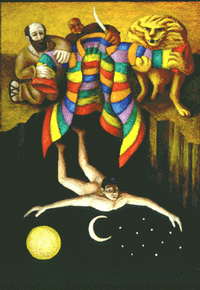 In Carlos Castaneda's stories about his apprenticeship into the world of sorcery, he describes that there are two main kinds of sorcerers: 'Dreamers' and 'Stalkers'. In Carlos Castaneda's stories about his apprenticeship into the world of sorcery, he describes that there are two main kinds of sorcerers: 'Dreamers' and 'Stalkers'.
A Stalker would be somebody who is a master at putting on or stepping into an existing reality. The term comes from a skill very useful in hunting of animals. The hunter would learn all the animal's ways, how it acts, how it thinks, when it does what, so that he would then be able to expect its moves. That would be equally useful to avoid dangerous animals. So, the stalker sorceror would be somebody who can step into different roles very easily, by being very attentive to detail, and able to morph himself into the required pattern, like a masterful actor.
A Dreamer is somebody who can dream new realities so well that one can step into them. A designer of virtual realities, so to speak. That might start with the ability to be conscious and in control while one is asleep, dreaming. Lucid dreaming, astral traveling. So, instead of just being asleep and maybe remembering a dream when waking up, the dreamer remains in control of his faculties and can travel around in the dream and rearrange things. The dreaming ability translates into a fluid ability to create new things, and to go places where nobody has gone before.
One reason I'm mentioning this here, is that there are many fields that need skills like these. The masterful ability to take in how something or someone works, so you can be in perfect rapport. The masterful ability to create something totally new, so well that you or somebody else can step directly into the experience, and proceed as if it is real.
[ Patterns | 2002-12-01 17:16 | | PermaLink ] More >
|
|
|
|
I was just about to 'complain' that there are too many things out there to write about, when I notice today that several of my sources are lamenting that it is a slow day with nothing to write about.
See, I started only recently to monitor a bunch of RSS feeds from the weblogs of other people I feel some connection with. For those who don't know, RSS is a standard protocol for gathering and aggregating regular feeds of posted items from various news sources. I use Radio Userland as the program to pick up those feeds, but I will, when I have a chance, build that feature into my own NewsLog program.
But I notice that there's a risk in just being reactive to what other people are saying or doing, and trying to keep up with it all. That's not what I have in mind. I'd like to be in touch with what is going on for others, but I'd like to not be stressed out if that happens to be a lot, and I'd like not to be bored if that happens to be only a little. I'd rather start right where I am, writing about what is on my mind, or on my desk, or in my life. And then, if I have extra steam, or I need inspiration, I might go out and look for what other people are getting themselves into. In other words, I want it to be driven by ME. I don't want to be a slave to RSS feeds any more than I want to be a slave to keeping up with my e-mail, or with the news in the newspaper. I just needed to state that.
[ Diary | 2002-12-01 18:51 | | PermaLink ] More >
|
|
|
|
 David Reed says in The Sky's No Longer the Limit that there is essentially no longer any reason to regard radio spectrum as limited. Lots of policies and procedures around the use of radio waves are based on the fundamental assumption that it is a very limited resource, and that governments need to assign different frequencies for specific different purposes. Or, worse, they sell part of the spectrum for huge sums to private enterprises. Anyway, the result is that most of it is unused, and that a few very popular uses of it (cellphones and wireless networking) have too little to work with. There are technologies, such as software-defined radio or UltraWideBand, that could use the spectrum in much more flexible ways. Reeds is very optimistic, and he is somebody worth listening to. David Reed says in The Sky's No Longer the Limit that there is essentially no longer any reason to regard radio spectrum as limited. Lots of policies and procedures around the use of radio waves are based on the fundamental assumption that it is a very limited resource, and that governments need to assign different frequencies for specific different purposes. Or, worse, they sell part of the spectrum for huge sums to private enterprises. Anyway, the result is that most of it is unused, and that a few very popular uses of it (cellphones and wireless networking) have too little to work with. There are technologies, such as software-defined radio or UltraWideBand, that could use the spectrum in much more flexible ways. Reeds is very optimistic, and he is somebody worth listening to.
[ Technology | 2002-12-01 19:41 | 0 comments | PermaLink ]
|
|
|
|
Robert X. Cringely has excellent advice for the music, film and print industries. His column is always well researched and argued. Here he has some excellent analogies about how monopolies fight change, in part by pretending to deliver what people want, but doing it really poorly."My favorite historical example of this phenomenon comes from the oil business. In the 1920s, the Anglo-Persian Oil Company had a monopoly on oil production in the Middle East, which they generally protected through the use of diplomatic -- and occasionally military -- force against the local monarchies. Then the Gulf Oil Company of Pittsburgh, Pennsylvania, literally sneaked into Kuwait and obtained from the Al-Sabah family (who still run the place) a license to search for oil. The Anglo-Persian Oil Company did not like Gulf's actions, but they were even more dismayed to learn that Gulf couldn't be told to just go to hell. Andrew Mellon, of the Pittsburgh Mellons, was the U.S. Secretary of the Treasury, and he wasn't about to let his oil company be pushed around by the British Foreign Office. So Anglo-Persian and the Foreign Office did their best to delay Gulf, which worked for several years. They lied a little, lost a few maps, failed to read a telegram or two, and when Gulf still didn't go away, they turned to acting stupid. As the absolute regional experts on oil exploration, they offered to do Gulf's job, to save the Americans the bother of searching for oil in Kuwait by searching for them. The Anglo-Persian Oil Company searched for oil in Kuwait for 22 years without finding a single drop." So, likewise, the music or movie companies are likely to come up with their own peer-to-peer solutions for media distribution. They will be expensive and they won't work very well, but they might slow their own demise.
[ Technology | 2002-12-01 20:53 | | PermaLink ] More >
|
|
| Saturday, November 30, 2002 |  |
|
|
|
What's a metalogue? I don't think it is in the dictionary. But a prologue is something one says in the beginning, to introduce something. An epilogue is something one says after the main action, as a sort of conclusion. A monologue is a prolonged presentation of some kind, spoken by one person. A dialogue is an exchange of ideas between two or more people. I suppose a metalogue would be talking ABOUT things that are happening, from a somewhat elevated perspective. Actually I think most weblogs I read are metalogues. They try to connect up some dots, try to discover clues in information and events, and try to connect that up with something bigger or deeper. Where are we going? What does it mean?
[ Information | 2002-11-30 01:01 | | PermaLink ] More >
|
|
|
|
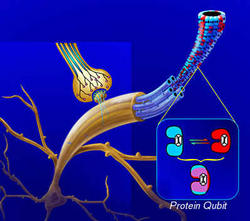 Most scientists who have studied brains and tried to figure out what consciousness is have started with the assumption that a brain is some kind of computer and that consciousness is is a new property that emerges from complex computation. I personally think that's a very silly assumption to make. But there is traditionally a huge split between the people who think that consciousness is some peculiar by-product of a fundamentally material universe, versus the people who think that consciousness exists eternally and the material universe is a temporary structure that it is manifested in. Oh and maybe a third category of people who think that some external deity made the whole thing, and it is none of our business to mess with it. Anyway, some of these camps might come closer together if it can become more clear what brains are really doing and what they have to do with consciousness. Most scientists who have studied brains and tried to figure out what consciousness is have started with the assumption that a brain is some kind of computer and that consciousness is is a new property that emerges from complex computation. I personally think that's a very silly assumption to make. But there is traditionally a huge split between the people who think that consciousness is some peculiar by-product of a fundamentally material universe, versus the people who think that consciousness exists eternally and the material universe is a temporary structure that it is manifested in. Oh and maybe a third category of people who think that some external deity made the whole thing, and it is none of our business to mess with it. Anyway, some of these camps might come closer together if it can become more clear what brains are really doing and what they have to do with consciousness.
Stuart Hameroff at the University of Arizona Center for Consciousness Studies has a theory of quantum consciousness. Together with Sir Roger Penrose he has developed a model of quantum computation in brain microtubules."Neurons may be far more complicated than mere switches. If we look inside neurons and other cells, we see highly ordered networks (the 'cytoskeleton') comprised of microtubules and other filamentous structures which organize cellular activities.. Microtubules are cylindrical polymers of the protein tubulin arranged in hexagonal lattices comprising the cylinder wall. Cooperative interactions among tubulin subunits within microtubules have been suggested to process information, as in molecular scale 'cellular automata'. As the states of tubulin are controlled by quantum mechanical internal forces (van der Waals London forces), they may exist in quantum superposition of multiple states ('quantum bits', or 'qubits'), and microtubules may be seen as quantum computers involved in cellular organization." As he says, the theory has met intense criticism from scientific, computational and philosophical establishments. No big wonder. And whether it works exactly like that, I have no way of judging. But intuitively it makes a lot of sense if a brain is a quantum computer that potentially might function as a lens that can be tuned into many different realities. Makes a lot more sense to me than that it would be some kind of big ROM chip. Memory chips don't forget things and then remember them again later.
[ Knowledge | 2002-11-30 01:42 | | PermaLink ] More >
|
|
|
|
Seb Paquet is providing a tour of some of the people listed in the sidebar of his weblog. That's a good idea, and I was thinking about doing that too. Otherwise it is just a list of names, many of which are unknown to many of the readers. Knowing what and how and why breathes life into the network of people.
[ Organization | 2002-11-30 23:59 | | PermaLink ] More >
|
|
|
|
 Jon Udell is talking about 'power law distributions', in part in reference to the book 'Linked' by Albert-László Barabási. 'Power-law distribution' is a condition that means essentially that small occurrences are extremely common, whereas large instances are extremely rare. Or, if we're talking about the Internet - there are a lot of sparsely connected sites and a very small number of highly connected sites. Jon Udell is talking about 'power law distributions', in part in reference to the book 'Linked' by Albert-László Barabási. 'Power-law distribution' is a condition that means essentially that small occurrences are extremely common, whereas large instances are extremely rare. Or, if we're talking about the Internet - there are a lot of sparsely connected sites and a very small number of highly connected sites.
The way that websites or in particular weblogs are inter-connected and referring to each other is working like the 6-degrees of separation model between people. Except for that on the web in general, studies have shown that webpages are an average of 19 clicks away from each other. And weblogs are an average of 4 clicks from each other.
So, you can get from one person or one weblog to any other in very few jumps, but you'll probably go through certain core nodes or core people that 'everybody' is linking to. That is useful, but there is also something unequal and possibly unfair about that. There's a 'rich-get-richer' pattern of clustering going on, in that people tend to go and link up with the people who are already most linked-up with everybody. The networking isn't entirely free-flowing.
I've certainly noticed that in any setting where you provide a list of people, sites or whatever, in order of popularity by some measure. Most people will concentrate on what they see at the top, and those people or sites get much more attention than they necessarily would deserve if the playing field were completely even.
Personally I would intuitively find it quite natural that a smaller number of sites are more connected than any other. But it bothers me if the system would be weighted in favor of reinforcing the sites that already are getting the most attention, rather than the ones that are of the highest quality.
Other good links on this:
Internet navigators think small,
Self-organized networks, Notre Dame University,
Clay Shirky
[ Organization | 2002-11-30 23:59 | 0 comments | PermaLink ]
|
|
| Friday, November 29, 2002 |  |
|
|
|
Peter Kaminski via Seb mentions:
Whoosh: Business in the Fast Lane,Tom McGehee on what makes a company suck or rock:
| Compliance Companies | Creation Companies | | Policy driven | Principle driven | | Rule based | Relationship based | | Conducts training | Allows for structured and unstructured learning | | Forced organization | Self-organizing | | Reactive | Proactive | | Good of organization over good of individual | Good of organization through good of individuals | | Measures activity | Measures outcome | | Ordered | Chaotic | | Closed system | Open system | | Patterned | Emergent | | Internal focus | External focus | | Risk avoidance | Opportunity creation | | Confuses models with reality | Understands modeling | | Tries to re-create past success | Tries to create new successes | | Methodology based | Model based | | Expert's mind | Beginner's mind | | Tolerates diversity | Thrives on diversity | | Seeks equilibrium | Seeks progress | | Deficit focused | Positive focused | | Creates burning platforms | Creates compelling opportunities |
Application to national governments or revolutionary organizations is left as an exercise for the reader.
[ Organization | 2002-11-29 16:01 | | PermaLink ] More >
|
|
|
|
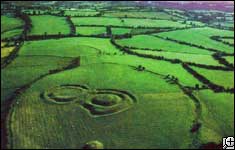 An enormous underground temple has been discovered under the Hill of Tara in Ireland, dated apparently from 2500 to 2300 B.C.. It was once surrounded by 300 towering oak posts and lies directly underneath the hill. It is a site that already has revealed many archaeological finds, but nothing of this magnitude. An enormous underground temple has been discovered under the Hill of Tara in Ireland, dated apparently from 2500 to 2300 B.C.. It was once surrounded by 300 towering oak posts and lies directly underneath the hill. It is a site that already has revealed many archaeological finds, but nothing of this magnitude.
[ History | 2002-11-29 16:42 | | PermaLink ] More >
|
|
|
|
New Scientist reports some progress in quantum computing. In short, as opposed to normal computers that use bits that can be either on or off, quantum computing uses 'qubits' that can be in several states at once. That opens the door to the rather magical possibility of finding all solutions to a given problem at the same time. Practical applications appear to be far off. The current progress concerned the ability to keep one atom away from interferance, while still being able to read what state it is in.
[ Science | 2002-11-29 17:05 | | PermaLink ] More >
|
|
|
|
technorati.com is the best site I've seen sofar for showing who links to who's weblogs. Well, mainly I'm interested in who links to what on MY log, mostly to see which stories worked well, and to discover new friends who are exploring similar topics. The other sites that attempt to show connections between weblogs have sofar not shown me much more than I already knew, but in my technorati listing I right away get to know some new people. And it is great that in this world, plagiarism is flattery. And a way of voting. I copy somebody else's story, and somebody else copies my copy, and that shows that all of us found it important and interesting.
[ Information | 2002-11-29 23:59 | | PermaLink ] More >
|
|
| Thursday, November 28, 2002 |  |
|
|
|
 I'm thankful that there is a little girl who will wake me up and take me by the hand to go outside in the wind and sit by the curb to watch the leaves blow off the trees. And who will hand me an instrument so we can march in a parade through the house. Somebody who will remember that it is always a good time for chocolate milk. I'm thankful that there is a little girl who will wake me up and take me by the hand to go outside in the wind and sit by the curb to watch the leaves blow off the trees. And who will hand me an instrument so we can march in a parade through the house. Somebody who will remember that it is always a good time for chocolate milk.
I am thankful for other people too. Thankful for love and loyalty, for being there no matter what, for caring, for trusting, for noticing and remembering things I forget. But mostly for waking me up to the preciousness of life in the moment. Making me breathe and making me smile.
[ Diary | 2002-11-28 01:59 | | PermaLink ] More >
|
|
|
|
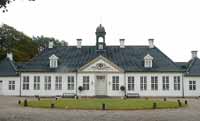 My phone rings at 3AM. "Er det flyttemanden? Det er Torben ovre fra Gammel Holte GÃ¥rd..." I was confused for a moment, and thought it was some Danish friend of mine making fun. Until I finally remembered that I have a phone number in Denmark, and I had it forwarded to the phone on my desk in Los Angeles. It was the first wrong number. It was a guy trying to call a moving company to move some stuff. But it sounded like he was right there, and it connected me right away with a bunch of things, like the Danish joviality. And he happened to call from a place very close to where I lived when I grew up. For that matter, a place I was looking at every day while waiting for the bus to school. It is a stately manor which today is a museum, and which I paid absolutely no attention to while waiting for the bus. Just made the world a good deal smaller suddenly. My phone rings at 3AM. "Er det flyttemanden? Det er Torben ovre fra Gammel Holte GÃ¥rd..." I was confused for a moment, and thought it was some Danish friend of mine making fun. Until I finally remembered that I have a phone number in Denmark, and I had it forwarded to the phone on my desk in Los Angeles. It was the first wrong number. It was a guy trying to call a moving company to move some stuff. But it sounded like he was right there, and it connected me right away with a bunch of things, like the Danish joviality. And he happened to call from a place very close to where I lived when I grew up. For that matter, a place I was looking at every day while waiting for the bus to school. It is a stately manor which today is a museum, and which I paid absolutely no attention to while waiting for the bus. Just made the world a good deal smaller suddenly.
[ Diary | 2002-11-28 14:07 | 0 comments | PermaLink ]
|
|
|
|
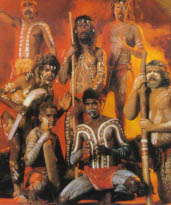 Mikela Tarlow talks in "Digital Aboriginal" about a traveler who had spent many years in the Australian outback with an aboriginal tribe. He explained that the aboriginal elders counseled their people to avoid the seduction of agriculture. Mikela Tarlow talks in "Digital Aboriginal" about a traveler who had spent many years in the Australian outback with an aboriginal tribe. He explained that the aboriginal elders counseled their people to avoid the seduction of agriculture."Suddenly, instead of following the weather, you want the weather to be different. And it is now easier to put things in straight lines. And because you have planted, you need fences. And since you have planted, you can accumulate possessions. And once your tribe is bound to a fixed address, forms of hierarchy emerge that were not possible when it had to stay on the move. Because you have put down roots, for the first time you must consider defending your territory. Thus, convenient as it is, planting is the beginning of control. Merely because you put a small seed in the ground, you are now invested in a whole system of maintenance that requires you to stay put. You are no longer free to follow what calls. So, the aboriginal elders wisely teach their people to avoid agriculture. The aboriginal spirit requires the freedom to follow the wind." Hm, that is certainly different from the way westeners normally think. For us it is often a powerful metaphor that we're putting seeds in the ground and staying around to nuture and defend them. But this makes sense on several levels. Maybe a hint of another way of being, where we don't trap ourselves in our own net of obligations and expectations."His profound sensitivity is possible only because he does not have to wait for seeds he has planted. His perceptions can be long and deep, since he has no territory that he must defend. His mind is quiet, since he is not attached to outcomes. Because he does not have to plan, his spirit is free."
[ Inspiration | 2002-11-28 15:06 | | PermaLink ] More >
|
|
| Wednesday, November 27, 2002 |  |
|
|
|
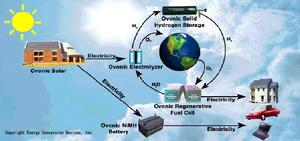 Joi Ito talks about the Hydrogen Economy: "The picture above is ECD's vision of the Hydrogen Economy. Get Carbon out of the picture. Reduce the cycle to the basic elements of the universe. Photons creating energy to break H2O into Hydrogen and Oxygen. Oxygen goes back to the atmosphere and the Hydrogen is stored and transported in the Hydride material. The Hydrogen is later extracted to create energy through combustion or through the creation of electrical energy with a fuel cell. This electricity can be stored in a Hydride battery which is also based on Hydrogen. The electricity obviously can be used for propulsion or be converted into meta-energy, or information. Photons->Hydrogen->Electrons->Bits thatÂ’s all we need. No CO2, fossil fuels, Uranium or any of the non-big-bang stuff please. Oh and by the way, the basic material and the phenomenon used to store hydrogen in a solid, the convert hydrogen in to electricity and the store electricity in hydride batteries is the based on the same basic science." Joi Ito talks about the Hydrogen Economy: "The picture above is ECD's vision of the Hydrogen Economy. Get Carbon out of the picture. Reduce the cycle to the basic elements of the universe. Photons creating energy to break H2O into Hydrogen and Oxygen. Oxygen goes back to the atmosphere and the Hydrogen is stored and transported in the Hydride material. The Hydrogen is later extracted to create energy through combustion or through the creation of electrical energy with a fuel cell. This electricity can be stored in a Hydride battery which is also based on Hydrogen. The electricity obviously can be used for propulsion or be converted into meta-energy, or information. Photons->Hydrogen->Electrons->Bits thatÂ’s all we need. No CO2, fossil fuels, Uranium or any of the non-big-bang stuff please. Oh and by the way, the basic material and the phenomenon used to store hydrogen in a solid, the convert hydrogen in to electricity and the store electricity in hydride batteries is the based on the same basic science."
[ Energy | 2002-11-27 17:42 | | PermaLink ] More >
|
|
|
|
And now for the Greenpeace Guide to Environmentally-Friendly Sex. They're only half kidding. In brief, do it during the day to save electricity. Don't involve any genetically engineered fruit. If you're gonna do it in the yard, make sure there are no pesticides in the grass. Don't wear anything PVC or vinyl, but rubber or leather is good. And take a shower together to conserve water.
[ Nature | 2002-11-27 17:51 | | PermaLink ] More >
|
|
|
|
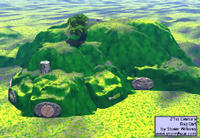 This guy is working on building his own house in a hobbit hole constructed out of concrete pipes. Well, I've always had a fantasy about having an underground house, but maybe not quite like that. This guy is working on building his own house in a hobbit hole constructed out of concrete pipes. Well, I've always had a fantasy about having an underground house, but maybe not quite like that.
[ Stories | 2002-11-27 18:06 | | PermaLink ] More >
|
|
|
|
Jon Udell says: "I was shocked to discover a nest of pirates yesterday, operating brazenly right here in my hometown. They were gathered in a large nondescript building, reading and talking quietly and in some cases listening to music. Some kind of social club, perhaps? Yes, but with a profoundly subversive theme: "sharing" content. This establishment houses large collections of books, magazines, audiotapes, videotapes, CDs, DVDs. And it "shares" these with its patrons. I watched in amazement as people left the building carrying armloads of these content assets, which they "borrow" without paying a nickel to the copyright holders. It's frightening, really. Who knew?"
[ Information | 2002-11-27 22:29 | | PermaLink ] More >
|
|
|
|
Dave Winer announces that Radio Userland, a popular weblogging program, has a new feature of being able to export all posted entries into a standard format, RSS 2.0. RSS is traditionally the format used for syndicating streams of news postings, but 2.0 is flexible enough to store a whole weblog. I'm going to look into implementing that feature, and hopefully it is flexible enough to store weblogs created in my NewsLog program as well. I'm a bit worried about whether it can handle the pictures. Anyway, what this kind of thing can mean is an easy way of moving from one weblog software to another, an easy way of backing up the contents of your weblog, and it opens the door to programs that can browse freely through the content of many weblogs.
[ Programming | 2002-11-27 22:29 | 0 comments | PermaLink ]
|
|
| Tuesday, November 26, 2002 |  |
|
|
|
 There is very little I know for certain. I know that I am conscious of my own existence, and I'm aware of many changing perceptions of the world I appear to be in, and I have abstract thoughts and feelings related to my experience. That's about it. Anything that my perceptions or my thoughts or my feelings are telling me is something I'm guessing. An abstract over-simplification of something that possibly is real. I have formed a certain extensive mental model of what the world is like, based on what I have perceived and thought, and then tested and verified, but I know it is only my best guess, even when it works well. The only thing I know for sure is that I am conscious right now, and conscious of my own consciousness. One of the first things I notice is that my consciousness returns after times when I haven't been conscious, so one of my first logical guesses is that my own existence is more fundamental than my consciousness, and I keep existing even when I forget to notice it. All that it takes to bring me back is that I notice. There is very little I know for certain. I know that I am conscious of my own existence, and I'm aware of many changing perceptions of the world I appear to be in, and I have abstract thoughts and feelings related to my experience. That's about it. Anything that my perceptions or my thoughts or my feelings are telling me is something I'm guessing. An abstract over-simplification of something that possibly is real. I have formed a certain extensive mental model of what the world is like, based on what I have perceived and thought, and then tested and verified, but I know it is only my best guess, even when it works well. The only thing I know for sure is that I am conscious right now, and conscious of my own consciousness. One of the first things I notice is that my consciousness returns after times when I haven't been conscious, so one of my first logical guesses is that my own existence is more fundamental than my consciousness, and I keep existing even when I forget to notice it. All that it takes to bring me back is that I notice.
[ Inspiration | 2002-11-26 03:53 | | PermaLink ] More >
|
|
|
|
Arch-skeptic Michael Shermer says some good things about intuition in The Captain Kirk Principle - Intuition is the key to knowing without knowing how you know:"Intuition is not subliminal perception; it is subtle perception and learning-- knowing without knowing that you know. Chess masters often "know" the right move to make even if they cannot articulate how they know it. People who are highly skilled in identifying "micromomentary" facial expressions are also more accurate in judging lying. In testing college students, psychiatrists, polygraphists, court judges, police officers and Secret Service agents on their ability to detect lies, only the agents, trained to look for subtle cues, scored above chance. Most of us are not good at lie detection, because we rely too heavily on what people say rather than on what they do."
[ Knowledge | 2002-11-26 04:14 | | PermaLink ] More >
|
|
|
|
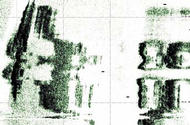 More about the possible man-made structures seen on sonar 2000ft underwater off the west coast of Cuba. Still nobody has gotten around to sending a submarine down there to take real pictures, so there is much speculation. The most controversial aspect is that the water depth would indicate that the structures would be at least 50,000 years old. More about the possible man-made structures seen on sonar 2000ft underwater off the west coast of Cuba. Still nobody has gotten around to sending a submarine down there to take real pictures, so there is much speculation. The most controversial aspect is that the water depth would indicate that the structures would be at least 50,000 years old.
[ Science | 2002-11-26 04:40 | 0 comments | PermaLink ]
|
|
|
|
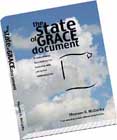 Tom Atlee mentions the State of Grace Document, which is an innovative alternative to contracts in various kinds of relationships, including businesses and personal relationships. It was conceived by Maureen McCarthy. As opposed to contracts, which usually have the premise that the other party quite likely will try to screw you, the State of Grace document has the premise that the parties both want to remain in or return to the state of grace that they started out with, where they're aligned and things are just flowing naturally. So, when a time of transition arrives, where it is no longer working, the point would either be to find the way back to that state, or to revise the agreement, or to realize that it is no longer there, so the relationship is ending. Maureen says: Tom Atlee mentions the State of Grace Document, which is an innovative alternative to contracts in various kinds of relationships, including businesses and personal relationships. It was conceived by Maureen McCarthy. As opposed to contracts, which usually have the premise that the other party quite likely will try to screw you, the State of Grace document has the premise that the parties both want to remain in or return to the state of grace that they started out with, where they're aligned and things are just flowing naturally. So, when a time of transition arrives, where it is no longer working, the point would either be to find the way back to that state, or to revise the agreement, or to realize that it is no longer there, so the relationship is ending. Maureen says:"The State of Grace Document is a radical new way to see the world. It's a tool for those who are searching for a non-litigious way to resolve a difficult situation. Or in the cases where [we] would never resort to that, but the pain of a bad ending leaves us exhausted, it's a remarkable path to peace. It's a concept not yet in practice that will cause great change in the world when adopted because it addresses the potential for problems up front in a loving manner. As a society we avoid saying the marriage could end before the ceremony has begun, the job might not work out as planned, or the business partnership might not be the best route as we move forward. Reality says it's all possible, but it seems so distasteful to acknowledge it. With the State of Grace Document a new and very elegant approach has been created to address the possibilities, while keeping the love, honor and integrity intact."
[ Organization | 2002-11-26 19:10 | | PermaLink ] More >
|
|
<< Newer stories Page: 1 ... 80 81 82 83 84 ... 97 Older stories >> |
|

This is a collage of things that catch my eye, things that need to be said, and stuff I really care about
TRUTH
BEAUTY
FREEDOM
LOVE
TECHNOLOGY
|
| Mon | Tue | Wed | Thu | Fri | Sat | Sun |
|---|
|
|
|
|
|
|
1 |
| 2 |
3 |
4 |
5 |
6 |
7 |
8 |
| 9 |
10 |
11 |
12 |
13 |
14 |
15 |
| 16 |
17 |
18 |
19 |
20 |
21 |
22 |
| 23 |
24 |
25 |
26 |
27 |
28 |
|
|




